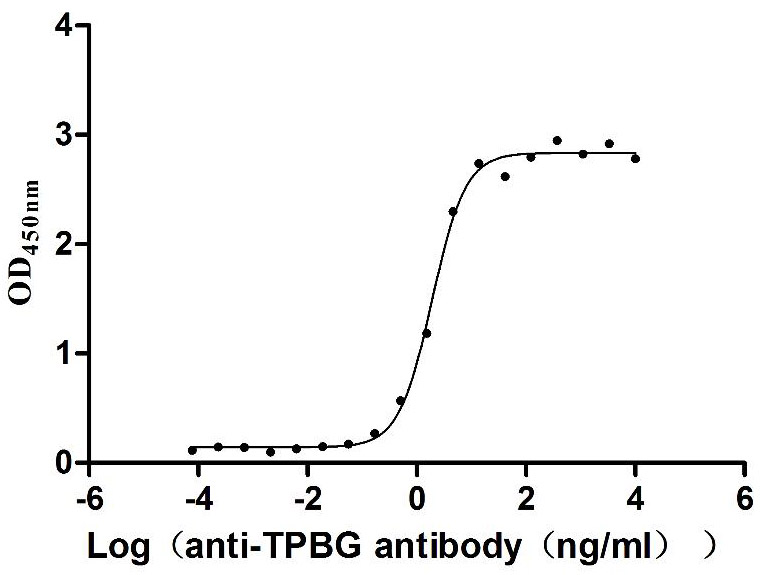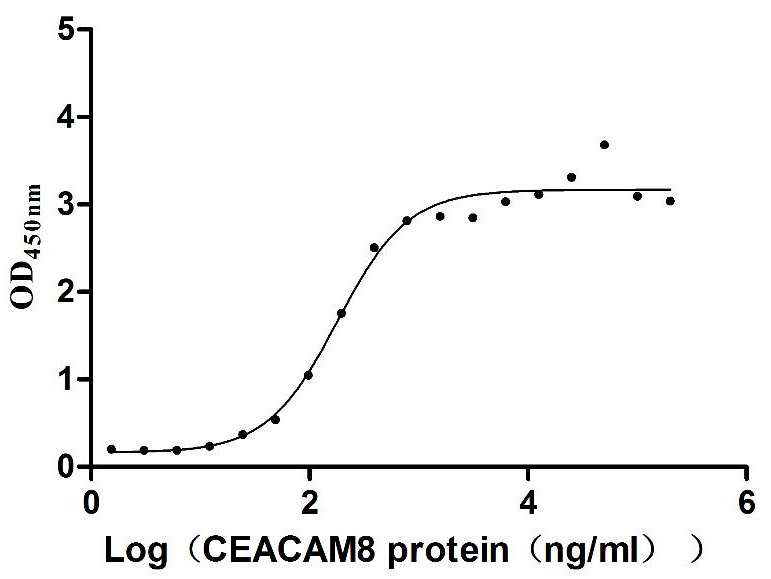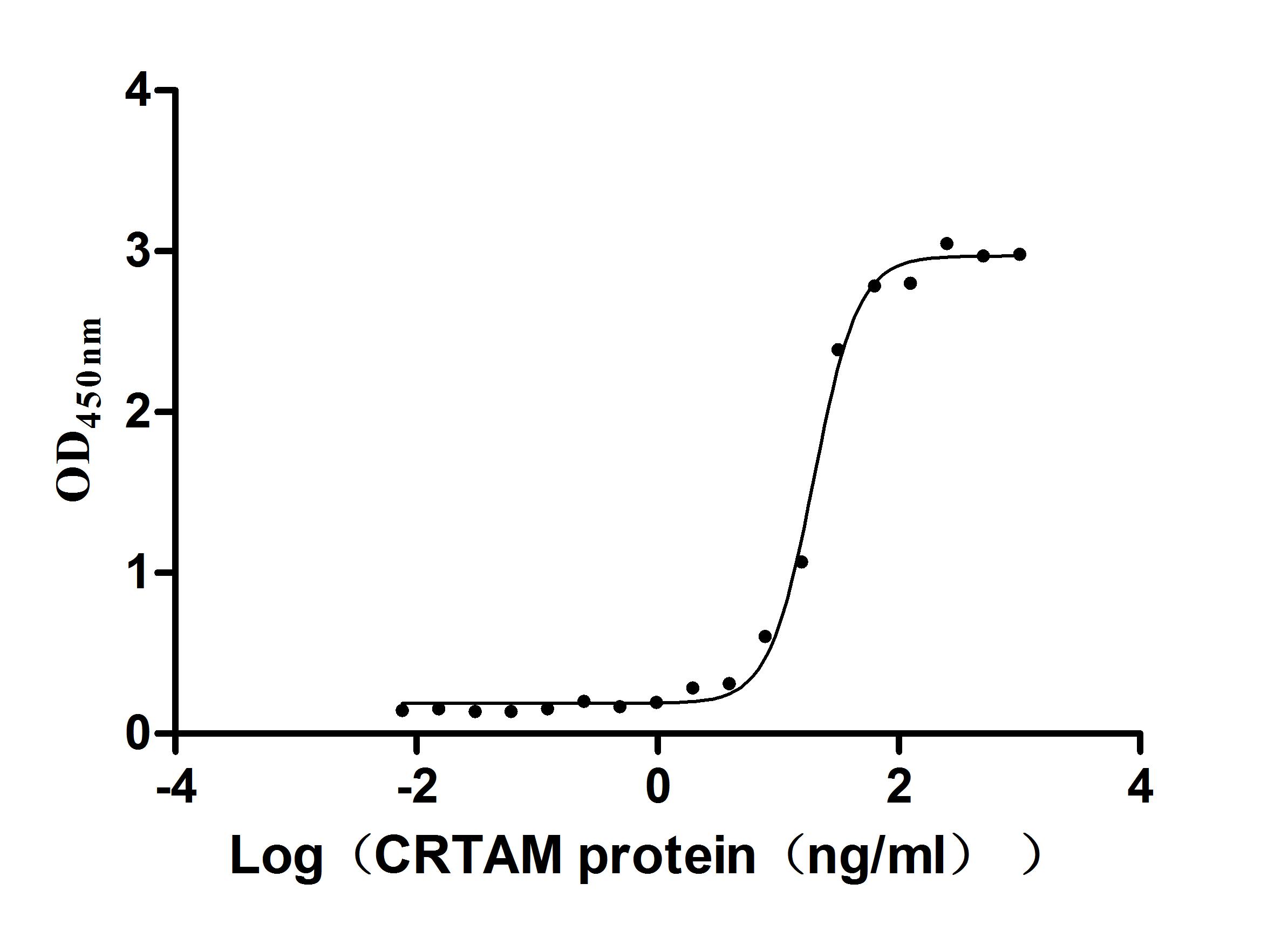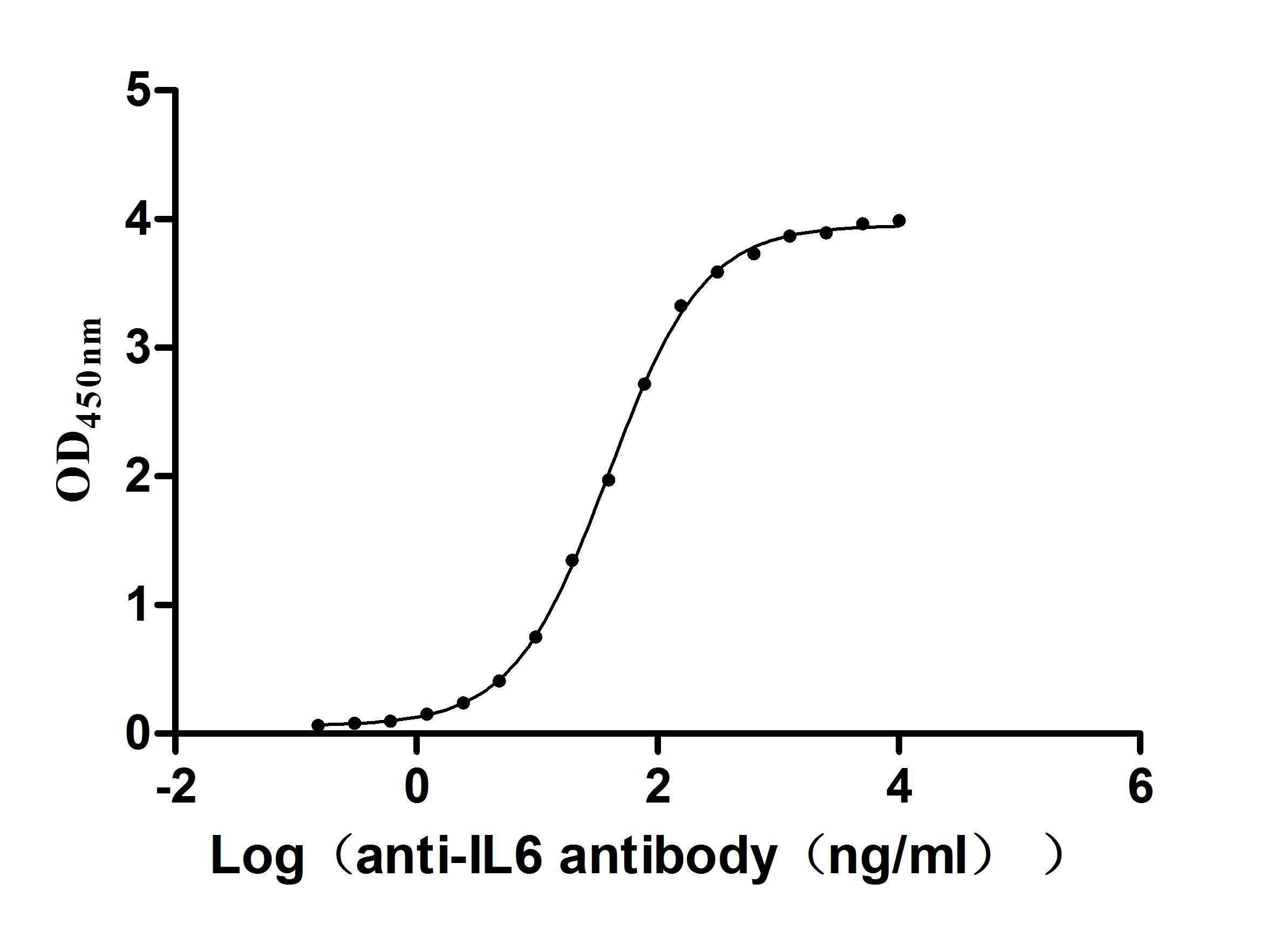Recombinant Mouse Adenosine receptor A1 (Adora1), partial
-
货号:CSB-YP723331MO1
-
规格:
-
来源:Yeast
-
其他:
-
货号:CSB-EP723331MO1
-
规格:
-
来源:E.coli
-
其他:
-
货号:CSB-EP723331MO1-B
-
规格:
-
来源:E.coli
-
共轭:Avi-tag Biotinylated
E. coli biotin ligase (BirA) is highly specific in covalently attaching biotin to the 15 amino acid AviTag peptide. This recombinant protein was biotinylated in vivo by AviTag-BirA technology, which method is BriA catalyzes amide linkage between the biotin and the specific lysine of the AviTag.
-
其他:
-
货号:CSB-BP723331MO1
-
规格:
-
来源:Baculovirus
-
其他:
-
货号:CSB-MP723331MO1
-
规格:
-
来源:Mammalian cell
-
其他:
产品详情
-
纯度:>85% (SDS-PAGE)
-
基因名:
-
Uniprot No.:
-
别名:Adora1; Adenosine receptor A1
-
种属:Mus musculus (Mouse)
-
蛋白长度:Partial
-
蛋白标签:Tag type will be determined during the manufacturing process.
The tag type will be determined during production process. If you have specified tag type, please tell us and we will develop the specified tag preferentially. -
产品提供形式:Lyophilized powder
Note: We will preferentially ship the format that we have in stock, however, if you have any special requirement for the format, please remark your requirement when placing the order, we will prepare according to your demand. -
复溶:We recommend that this vial be briefly centrifuged prior to opening to bring the contents to the bottom. Please reconstitute protein in deionized sterile water to a concentration of 0.1-1.0 mg/mL.We recommend to add 5-50% of glycerol (final concentration) and aliquot for long-term storage at -20℃/-80℃. Our default final concentration of glycerol is 50%. Customers could use it as reference.
-
储存条件:Store at -20°C/-80°C upon receipt, aliquoting is necessary for mutiple use. Avoid repeated freeze-thaw cycles.
-
保质期:The shelf life is related to many factors, storage state, buffer ingredients, storage temperature and the stability of the protein itself.
Generally, the shelf life of liquid form is 6 months at -20°C/-80°C. The shelf life of lyophilized form is 12 months at -20°C/-80°C. -
货期:Delivery time may differ from different purchasing way or location, please kindly consult your local distributors for specific delivery time.Note: All of our proteins are default shipped with normal blue ice packs, if you request to ship with dry ice, please communicate with us in advance and extra fees will be charged.
-
注意事项:Repeated freezing and thawing is not recommended. Store working aliquots at 4°C for up to one week.
-
Datasheet :Please contact us to get it.
相关产品
靶点详情
-
功能:Receptor for adenosine. The activity of this receptor is mediated by G proteins which inhibit adenylyl cyclase.
-
基因功能参考文献:
- Loss of A1AR expression results in an increased susceptibility to noise-induced cochlear neural injury and hearing loss. PMID: 28034618
- Expression of the SENP2 gene was suppressed by theobromine. In vivo knockdown studies showed that AR1 knockdown in mice attenuated the anti-adipogenic effects of theobromine in younger mice. Theobromine suppresses adipocyte differentiation and induced C/EBPbeta degradation by increasing its sumoylation. PMID: 28965824
- The three receptor sets considered (mAChR, AR and TrkB receptors) intervene in modulating the conditions of the competition between nerve endings. PMID: 27339059
- Systemic inflammatory response syndrome-associated lymphopenia is initiated by A1R desensitization and adenosine-mediated inhibition of IL-15 production is part of the mechanism that accounts for the delay in leukopenia recovery in patients with severe sepsis. PMID: 28495790
- Results demonstrated a significant downregulation of adenosine A1 receptors in the cortex and striatum, concomitant to striatal D2R downregulation in iron deficient mice and rats. PMID: 27600688
- Adenosine A1A receptor and adenosine A3A receptor agonists and adenosine 5'-monophosphate cause regulated hypothermia that was characterized by a drop in total energy expenditure, physical inactivity, and preference for cooler environmental temperatures, indicating a reduced body temperature set point. PMID: 27914963
- over-expression of sEH enhances A1AR-dependent contraction and reduces KATP channel-dependent relaxation in MAs. These results suggest a possible interaction between sEH, A1AR, and KATP channels in regulating vascular tone. PMID: 27629787
- Results indicate that the adenosine A1 receptor is an important molecular component mediating hypoxic depression in adult mice and it appears to stabilize respiration of neonatal mice PMID: 26593641
- The findings of this study implicated a glial-neuronal circuit, mediated by Ado, neuronal AdoRA1, and glial AdK that can modulate sleep homeostasis in a manner influenced by glial metabolic state. PMID: 27030757
- Chronic cerebral ischemia in a mouse model induced down-regulation of adenosine A1 receptors. PMID: 25982512
- Activation of A3, A2A and A1 Adenosine Receptors in CD73-Knockout Mice Affects B16F10 Melanoma Growth, Neovascularization, Angiogenesis and Macrophage Infiltration PMID: 26964090
- A1 receptors regulate metabolism and islet endocrine and vascular functions during ageing PMID: 25835725
- Adenosine A1 receptor knockout mice displayed increased depressive-like behavior. PMID: 26247862
- data support the interpretation that adenosine A receptors localized to the pontine reticular formation significantly alter nociception. PMID: 24976513
- did not identify phenotypic modifications of A1AR-related effects on blood pressure, heart rate and plasma renin by differences in genetic background PMID: 25182861
- Interaction between angiotensin II and adenosine in VSMC normally involves A1 receptor signalling PMID: 25251152
- Extracellular cAMP, through its metabolite adenosine, reduced cardiomyocyte cAMP formation and hypertrophy by activating A1 adenosine receptors while delivering an antifibrotic signal to cardiac fibroblasts by A2 adenosine receptor activation. PMID: 25401477
- NPS evokes central antinociceptive effects by activating both A1 and A2A receptors during phase 1, but only the adenosine A2A receptor during phase 2 of the formalin test PMID: 25447449
- These findings indicate that adenosine activation of leukocyte adenosine A1 receptor plays a significant role in their recruitment to the infected lung and contributes to influenza pathogenesis. PMID: 24965449
- The A1 adenosine receptor may play a role in the development of atherosclerosis PMID: 24525840
- A1ARs mediate in utero caffeine effects on cardiac function and growth and that caffeine exposure leads to changes in DNA methylation. PMID: 24475304
- Adenosin inhibited Lipopolysaccharide-increased HIF1alpha accumulation under both normoxic and hypoxic conditions, through activation of A1 and A3 adenosine receptors. PMID: 23969284
- These results indicate that inosine possesses an antidepressant-like effect probably through the activation of adenosine A1 and A2A receptors PMID: 23613131
- Suggest that A1 adenosine receptor counteracts the A2A AR-mediated coronary flow increase during reactive hyperemia. PMID: 24043252
- The splicing of Adora1 and loss of Adora1 expression on alpha-cells may explain the hyperglucagonemia observed in prediabetic NOD mice and may contribute to the pathogenesis of human type 1 diabetes. PMID: 24264405
- Adenosine regulates bone metabolism via A1, A2A, and A2B receptors. PMID: 23682121
- Endogenous A1A receptor activation protects against acute ethanol-induced liver injury by reducing oxidative stress. PMID: 23692951
- An important role was determined for adenosine A1 receptors in RANKL-induced osteoclastogenesis. PMID: 22311477
- tested whether induction of cytoprotective sphingosine kinase-1 and sphingosine-1-phosphate synthesis might be the mechanism in A1 adenosine receptor-mediated renal protection from ischemia PMID: 22695326
- these results show that ADORA1 is enriched on neuron cells where it functions to control norepinephrin release. Activation of this receptor during penile erection results in reduced norepinephrin release and reduced cavernosal smooth muscle contraction, therefore facilitating penile erection. PMID: 22862844
- The presented data provide for the first time direct evidence that the upregulation of A(1)R enhances neuronal survival. PMID: 22899189
- The increase in blood pressure seen in A(1)-AR knockout mice is lower than that seen in wild-type mice but was increased by ANG II nonetheless. The presence of A(1)-ARs during a low dose of ANG II-infusion limits Na(+) and phosphate excretion. PMID: 22874421
- It was shown that adenosine A(1) receptors in the pancreas are involved in regulating the temporal patterns of insulin release. PMID: 22550063
- Data suggest that expression of Adora1 is too low to play a major role in regulation of lipogenic gene expression in hepatocytes; these results are in contrast to the high expression of Adora1 in cerebral cortex. PMID: 22449383
- caffeine alters embryonic cardiac function and disrupts the normal cardiac response to hypoxia through blockade of A1AR action PMID: 22164264
- The data suggested that, in the absence of A2A adenosine receptor, omega-hydroxylase induces vasoconstriction through mitogen-activated protein kinases via upregulation of adenosine A1 receptor and protein kinase C-alpha. PMID: 22160543
- AMP and a non-hydrolyzable AMP analog (deoxyadenosine 5'-monophosphonate, ACP) directly activated the adenosine A(1) receptor PMID: 22215671
- Adenosine can negatively regulate mouse duodenal motility either by activating A1 inhibitory receptors located post-junctionally or controlling neurotransmitter release via A1 or A2A receptors. PMID: 21615720
- pacemaking and conduction disturbances are induced via A(1)AR through concomitant stimulation of NADPH oxidase and PLC, followed by downstream activation of ERK and PKC with LCC as possible target. PMID: 21907719
- It was concluded that adenosine A(1)-receptors enhance preglomerular responses during NO inhibition and ANG II treatment. PMID: 21975649
- A1AR signaling contributes importantly to insulin-controlled glucose homeostasis and insulin sensitivity in C57BL/6 mice and is involved in the metabolic regulation of adipose tissue. PMID: 21831968
- results suggest that AR signaling represents a novel, endogenous modulator of BBB permeability. PMID: 21917810
- Both adenosine A(2A) and A(2B) receptors are required for adenosine A(1) receptor-mediated cardioprotection, implicating a role for interactions among receptor subtypes. PMID: 21743001
- Data suggest that adenosine deficiency may be relevant to human epilepsy and that a ketogenic diet can reduce seizures by increasing adenosine A1 receptor-mediated inhibition. PMID: 21701065
- Matrix metalloproteinase-mediated EGFR activation appears essential to cardiac protection and signaling via A1 adenosine receptors and preconditioning. PMID: 21460200
- A(1) and A(2B) receptors are both involved in differentiation to Treg, but through different mechanisms. PMID: 21557932
- these results suggest that A1 receptor-mediated signaling regulates EAAT2 expression in astrocytes. PMID: 21291865
- The results of this study suggested that both A1 as well as A2A receptor antagonists could be useful therapeutically to lower the risk of L-DOPA-induced dyskinesia in parkinson disease patients PMID: 20828543
- Adenosine A1 receptor-mediated inhibition of ghrelin release from the stomach is apparent when the tonic excitatory effect of adenosine is removed from the isolated perfused gastric mucosa. PMID: 20876230
- Data show that adenosine A1 and A2A receptors are not upstream of caffeine's dopamine D2 receptor-dependent reward-aversion effects. PMID: 20576036
显示更多
收起更多
-
亚细胞定位:Cell membrane; Multi-pass membrane protein.
-
蛋白家族:G-protein coupled receptor 1 family
-
数据库链接:
KEGG: mmu:11539
STRING: 10090.ENSMUSP00000043522
UniGene: Mm.298908
Most popular with customers
-
Recombinant Human C5a anaphylatoxin chemotactic receptor 1 (C5AR1)-VLPs (Active)
Express system: Mammalian cell
Species: Homo sapiens (Human)
-
Recombinant Human Claudin-6 (CLDN6)-VLPs (Active)
Express system: Mammalian cell
Species: Homo sapiens (Human)
-
Recombinant Macaca fascicularis Trophoblast glycoprotein (TPBG), partial (Active)
Express system: Mammalian cell
Species: Macaca fascicularis (Crab-eating macaque) (Cynomolgus monkey)
-
Recombinant Human Carcinoembryonic antigen-related cell adhesion molecule 6 (CEACAM6) (Active)
Express system: Mammalian cell
Species: Homo sapiens (Human)
-
Recombinant Human Cell adhesion molecule 1 (CADM1), partial (Active)
Express system: Mammalian cell
Species: Homo sapiens (Human)
-
Recombinant Human Carcinoembryonic antigen-related cell adhesion molecule 8(CEACAM8) (Active)
Express system: Mammalian cell
Species: Homo sapiens (Human)
-


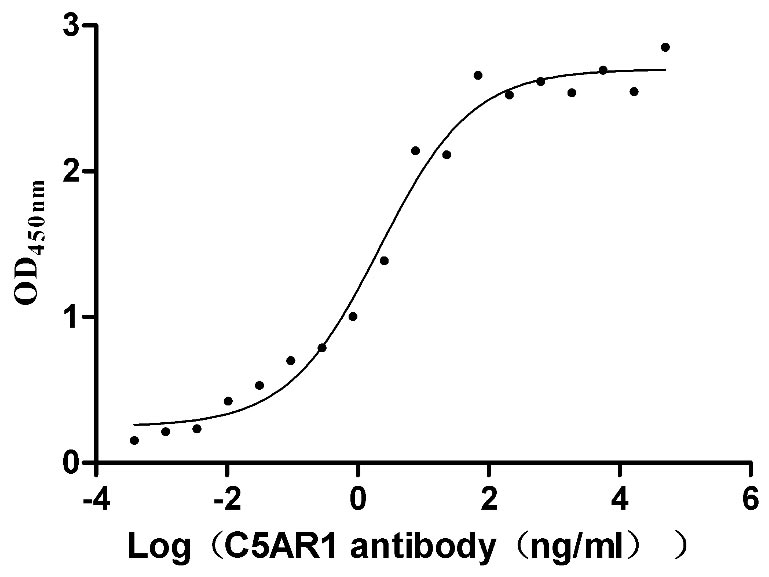
-AC1.jpg)
